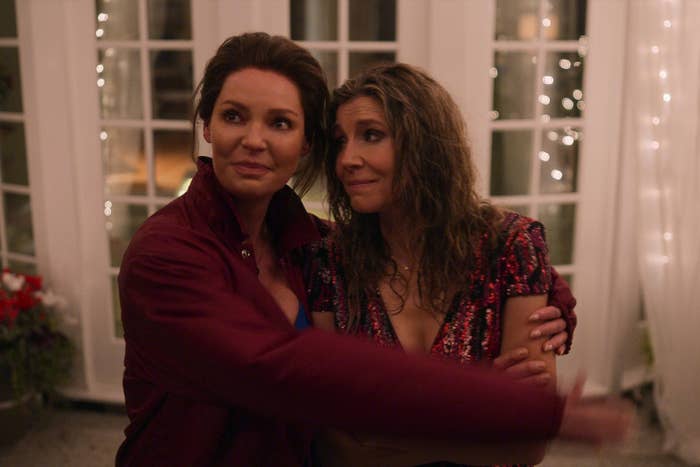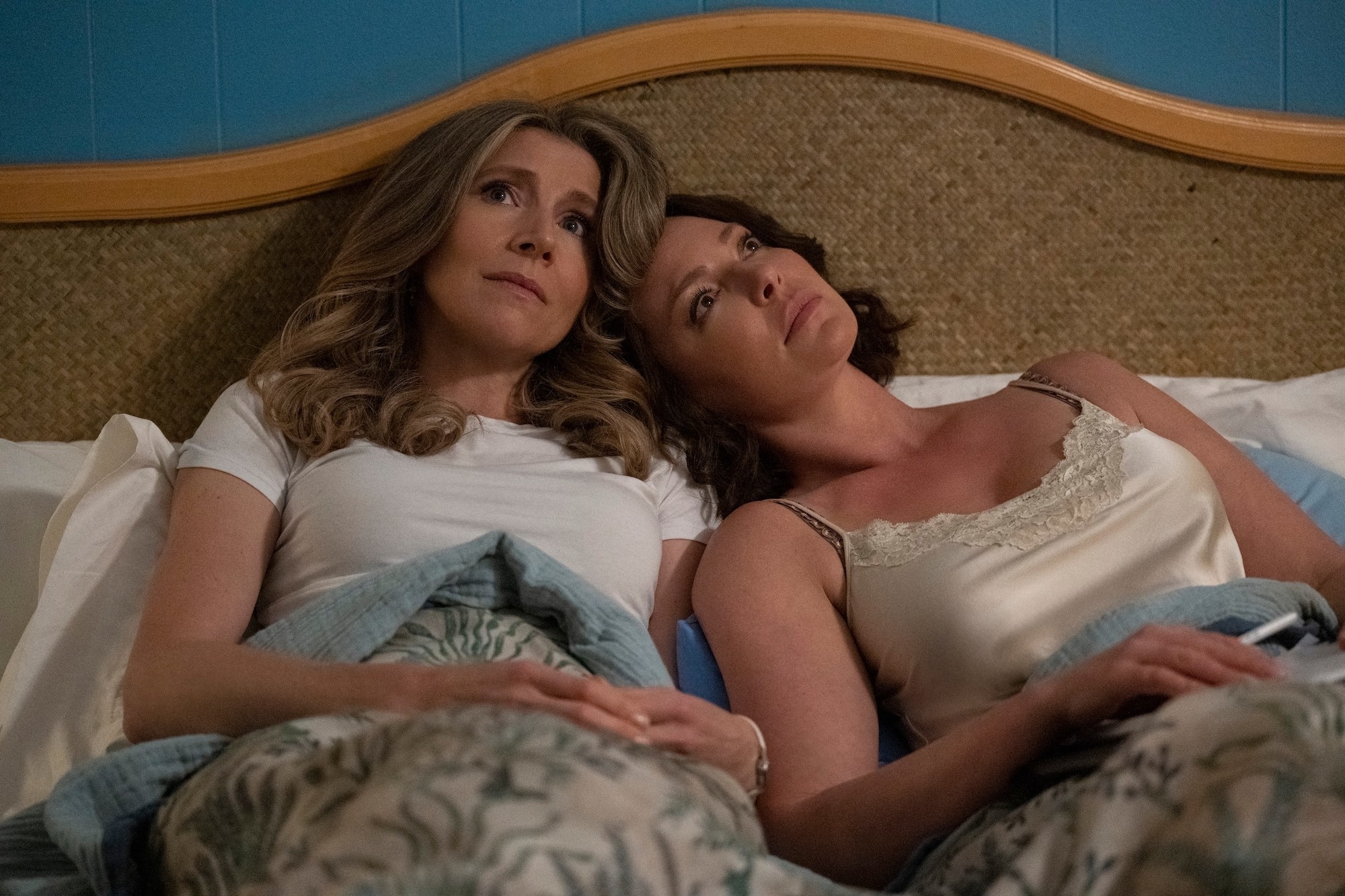
“Promise me that we will always be there for each other,” Tully Hart says to best friend Kate Mularkey on Netflix’s brazenly earnest Firefly Lane. “Cross my heart,” she replies.
The particular intimacy of women’s friendship has propelled some of TV’s most popular shows, from the table-flipping conflicts of Real Housewives to the more subdued prestige ennui of Girls and Insecure. Clashing values, shifting priorities, breakups, and reconciliations capture the ways straight women attempt to aid each other — sometimes unsuccessfully — as they navigate jobs, men, and other troubles of life under patriarchy.
Netflix has been churning out its own takes on the theme, like the real estate soap opera Selling Sunset and the popular Jane Fonda–Lily Tomlin buddy vehicle Grace and Frankie. And last year, the streaming company debuted the most sentimental offering of the bunch: Firefly Lane.
The show is based on a massively bestselling 2008 novel of the same name by historical romance writer Kristin Hannah, following the ups and downs between best friends Talullah “Tully” Hart and Kate Mularkey. Hannah told Netflix’s Tudum that she’d wanted to fill a market gap for younger boomer women, who’d been relatively absent from pop culture. So she wrote an “epic anthemic novel about women’s friendships that included all the music and the ambition and the things that we were struggling with in my generation.”
The book, which sold 1.2 million copies, follows the pair from their ’70s teen years through their struggles as career women juggling relationships in the ’80s and ’90s and into the early aughts.
The series is Grey’s Anatomy star’s Katherine Heigl’s big comeback — as both actor and producer — after she was half-banished from the industry’s A-list following some movie flops and industry chatter about her being a “difficult” woman (for calling out workplace harassment and the churning TV economy). Tully is Firefly Lane’s central character, an ambitious newscaster turned talk show host who struggles to let people into her life, except for her best friend, writer Kate (played with goofy allure by Scrubs star Sarah Chalke).
When the first season came out last year, the series shot to no. 1, stayed in Netflix’s top ten for weeks, and was quickly renewed. (Netflix is notoriously guarded about numbers, but reported that Firefly Lane got 49 million views within its first 28 days.)
Upon its release two weeks ago, the first nine episodes of the second season also quickly reached the top of the streamer’s list and has remained in the top three since then; a final installment is coming in summer 2023.
Firefly Lane didn’t get great reviews; critics took issue with the structurally messy way it moves around the three timelines. But the storytelling clearly strikes a chord. And its populist appeal and frothy charm rely on a commitment to treating friendship as equivalent to romance, and unpacking the utopian possibilities of friendship for women.
The show lavishes as much detail on the friends’ backstory as The Notebook did on its lovers’. The girls meet when Tully and her single mom move to Kate’s neighborhood in Washington state. (The book was partly inspired by Hannah’s years growing up in Snohomish, Washington, and attending the University of Washington.)
From the start, the series traffics in tropes. Tully is the pretty one and Kate is supposedly the awkwardly nerdy one, a duality stereotypically conveyed through Kate’s Coke-bottle glasses. (Talented actors Roan Curtis and Ali Skovbye play the ’70s teen versions of Kate and Tully.) The girl in the glasses convention of many teen movies typically symbolizes the “before” of a transformation undertaken to impress a boy — as in the ’90s rom-com She’s All That. Instead, here it’s used to create contrast in the budding friendship narrative.
As the show moves back and forth in time, we see how they were shaped as women, and what their friendship meant to each of them. Kate grew up in a “perfect” family with a stay-at-home mom and loving, respectful dad. Tully had to deal with a traumatized single mom, Cloud (Beau Garrett), who dealt with substance abuse issues and whom she had to basically parent.
The show gets at big themes of intergenerational trauma: how Tully’s relationship to her mom made it hard for her to trust people, making her friendship with Kate a valued safe space. In one scene, her hippie mom, uncomfortable with the uptight suburban vibe, acts out at a party, accidentally flashing a crowd of dads. A fight between Tully and Kate over a boy becomes secondary, as Kate understands that she has to care for her friend in the aftermath of Cloud’s behavior.

Though the friendship seems one-sided sometimes — Kate says she feels like she’s always cleaning up Tully’s messes — Tully helps push Kate out of her comfort zone. As she makes it in the news business, it’s Tully who gets Kate a break as a copywriter at her news station. And Tully encourages Kate to go after crush Johnny Ryan (Ben Lawson), a fellow producer who seems to be interested in Tully.
The resulting triangle isn’t reduced to romance: Both Johnny and Tully hunger for and battle over Kate’s attention. Over the course of their lives, we watch as marriage and children threaten to disrupt their relationship, but the women keep coming back to each other. When Tully experiences sexism at her job — in a funny Season 2 scene, a focus group deems her both “too shrill” and too sexual — it’s Kate who’s there for her. As Kate struggles with dating and her family, Tully babysits.
Kristin Hannah said the Kate character was a way of exploring her feelings about her mom, who died of cancer, and also the compromises and demands of being a working wife and mother.
There are also some clear-eyed arcs relating to the emotional challenges of cis hetero relationships. Kate ends up marrying Johnny. When he gets a job reporting on the Iraq War, they decide to separate. During a discussion about what didn’t work in their relationship, Johnny expresses that he was actually relieved when Kate did something wrong because it made him feel less guilty about his disconnection from the marriage. It’s a surprisingly subtle depiction of a straight man shaping a relationship by projecting his anxieties onto it.
And Firefly Lane doesn’t shy away from exploring how even chosen family members can cause so much pain. The last season ended on a friend breakup, and the cliffhanger hinged on what had caused it. And this season’s biggest plot point so far involves an intoxicated Tully crashing her car while driving Kate’s daughter, Marah (Yael Yurman), home.
The show slowly reveals that Tully was supposed to be watching Marah, but let her go to a party because her first girl crush would be there. Marah calls Tully and recounts a near–sexual assault scenario at the party and Tully is triggered, recalling her own teenage experience with a date rape at a party. Then a car smashes into them from behind.
After the crash, Kate is furious at Tully, and the two friends become estranged. When they finally meet up, Tully doesn’t tell Kate (presumably to protect Marah) about why she had rushed out of her home, slightly intoxicated, to pick up Marah. It’s yet another subtle way the show gets at how gendered trauma affects relationships, and how unspoken things can be debilitating. This plays out too in Tully’s struggles with reconciling with her mom, Cloud. She can’t quite apologize for the mistakes she made as a parent, so Tully can’t quite heal.
But Tully doesn’t want to re-create that dynamic with Kate. In one scene, Kate and Tully debate the famous line from Love Story, uttered with consummate melodrama and hetero toxicity by Ali McGraw’s Jenny. “Love means never having to say you’re sorry,” she says to golden boy Oliver (Ryan O’Neal). Tully agrees with the sentiment, but she swallows her pride to apologize to Kate. “I am not me without you,” she says. The apology didn't work, and the friends remain estranged. But there’s always next season. ●
